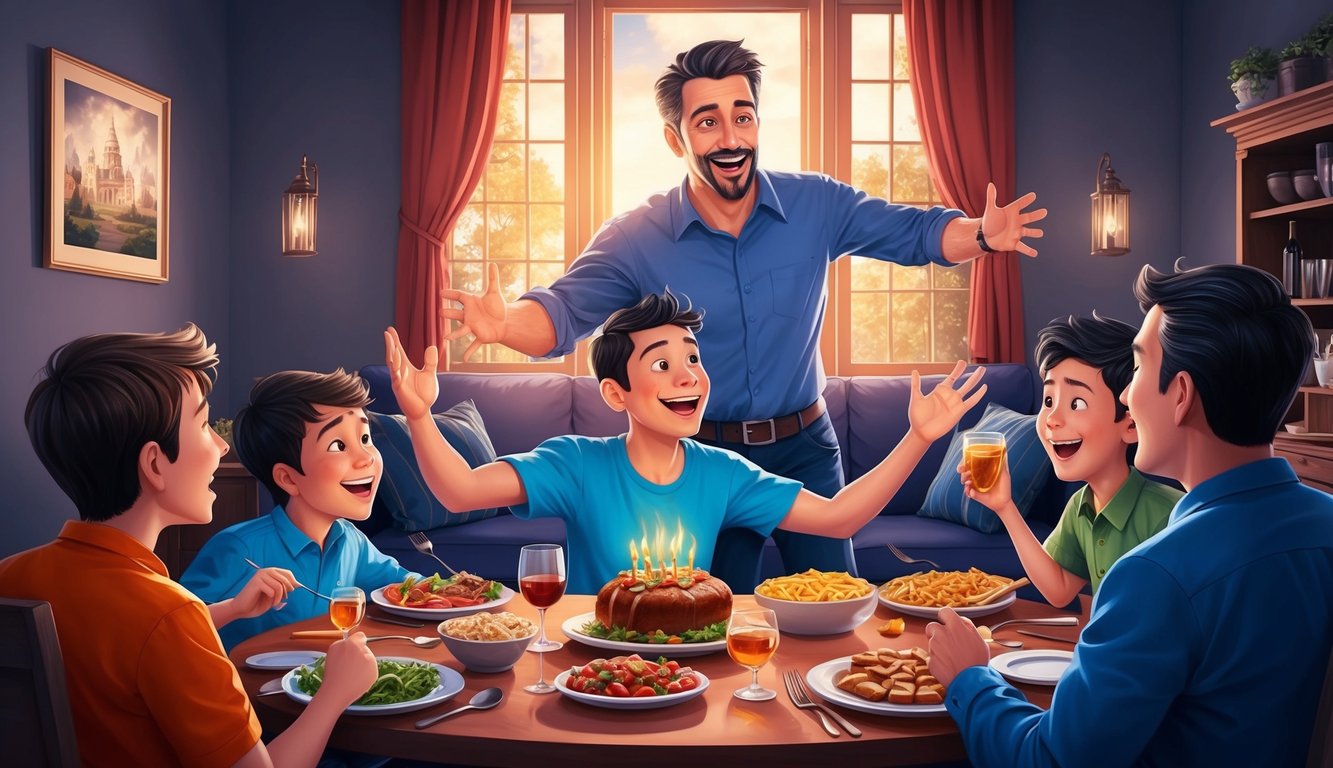Don’t Miss Out On This Unique Astrological Opportunity
Are you tired of spinning your wheels and getting nowhere? Simply put, you’re out of sync: you’re out of alignment with your astral configuration.
But: there’s a kind of map that can help you reclaim your alignment. Think of it as your own personal blueprint to success and happiness: a blueprint that will help you live your most amazing life.
Get started here.
The parable of the Lost Son, found in Luke 15:11-32, is a powerful and timeless story that highlights forgiveness, repentance, and unconditional love. At the heart of this parable is the profound message of forgiveness and acceptance, illustrating the boundless compassion of Jesus. This narrative not only addresses the younger son’s mistakes and eventual redemption but also sheds light on the father’s unwavering love and the older son’s struggle with jealousy.
In the parable, the younger son demands his inheritance and leaves home to live a carefree life, only to find himself in dire circumstances.
His return home, filled with remorse, is met with unexpected joy and forgiveness from his father, showing a love that knows no limits.
Meanwhile, the older son’s reaction to his brother’s return offers a complex look at human emotions, highlighting feelings of resentment often overlooked.
Exploring this parable helps you understand these deep themes and how they relate to your own life.
The actions and responses of each character in the story invite reflection on forgiveness, family dynamics, and personal growth, providing a mirror to your own experiences.
Key Takeaways
- The parable speaks to forgiveness and love.
- The younger son’s journey shows redemption.
- The elder son’s reaction highlights jealousy.
Context of the Parable
In Luke 15:11-32, Jesus tells the story of a father and his two sons.
This parable highlights themes of forgiveness, repentance, and unconditional love through its characters and their actions.
The Father and His Two Sons
The father in the parable represents a figure of love and compassion.
He has two sons, each with a different approach to life.
The younger son asks for his inheritance early, which is unusual and could be seen as disrespectful.
Despite this, the father grants his request, showing his willingness to let his children make their own choices.
The younger son leaves home and spends all his money recklessly.
When he finds himself in difficult circumstances, he decides to return home, hoping for forgiveness.
The father’s response is kind and forgiving, demonstrating unconditional love and acceptance.
This act reflects the wider message of Jesus about God’s love for humanity.
Division of the Estate
The division of the estate is a key part of the parable.
In this story, the younger son asks for his share of the inheritance ahead of time.
Receiving inheritance before a parent’s death might seem strange, but the father agrees.
This distribution marks the beginning of the son’s journey away from home.
The older son’s share of the estate remains, but his reaction to his brother’s return is critical.
He feels wronged by the father’s generous welcome to the repentant younger son.
This situation shows the importance of understanding fairness, jealousy, and redemption, highlighting lessons about human relationships.
The Younger Son’s Journey
In this narrative, the younger son seeks adventure and independence, leaving the comfort of his home.
He faces challenges that lead him to a moment of awakening and ultimately to reconciliation with his father.
Descent into Deprivation
The younger son decides to demand his share of the inheritance and sets off to a distant country.
There, he quickly squanders his wealth through wild living.
His carefree lifestyle eventually catches up with him when a severe famine strikes the land.
Desperate and out of resources, he finds himself starving and with no support.
In this dire situation, he hires himself out to a local citizen.
His job is to feed pigs, which is a humiliating task given his previous lifestyle. The contrast between his past life of luxury and his current state of poverty is stark. It’s a pivotal moment that highlights the depths of his fall from grace.
Moment of Realization
While feeding the pigs, the younger son experiences a powerful moment of realization.
As he watches the pigs eat, he reflects on his life choices and how far he’s fallen.
He even wishes he could eat the pods that the pigs are eating, a sign of his desperation.
This moment acts as a wakeup call.
The awareness of his condition leads him to remember his father’s house, where even the hired servants have more food than he does. He understands that he has squandered his life in pursuit of freedom without responsibility. This newfound clarity motivates him to take action, acknowledging his mistakes and planning a return to his family.
Return to the Father
With a renewed sense of purpose, the younger son decides to go back home.
He prepares a speech for his father, admitting his wrongdoings and expressing a desire to be treated not as a son, but as one of the hired servants.
This demonstrates his humility and willingness to accept the consequences of his actions.
Upon his return, the father sees him from a distance and is filled with compassion.
Rather than reprimanding him, the father welcomes him with open arms, celebrating his return.
The younger son’s journey illustrates the themes of repentance and forgiveness, showing the boundless compassion and love within the family.
Father’s Response

The father’s reaction in Luke 15:11-32 is a profound display of love and forgiveness.
This response demonstrates a compassionate welcome and a joyous celebration for his son’s return.
His actions reflect God’s boundless grace and willingness to restore those who repent.
This parable also aligns with the Matthew 28:19 meaning, which emphasizes making disciples and embracing others with God’s love.
Through the father’s response, we see a powerful representation of divine mercy and redemption.
Compassionate Welcome
When you read the parable, you witness the father’s deep compassion as soon as he sees his son returning.
He doesn’t wait for an apology or explanation.
Instead, he runs to his son, an act that goes beyond cultural norms of the time, where older men would not run.
This shows the father’s eagerness and love.
Even when the son expresses his feeling of being no longer worthy, the father dismisses it with a heartfelt embrace.
His compassion is further shown by dressing the son in the best robe, a symbol of honor and acceptance.
Additionally, he places a ring on his finger and sandals on his feet, restoring his status in the family and signifying dignity and restoration.
This is a powerful message of unconditional love.
Celebration of Return
The father’s response does not end with compassion; it extends to a grand celebration.
Upon welcoming his son, he calls to prepare a feast with the fattened calf, a sign of abundance and joy.
This act shows that the father values the son’s return over past mistakes, emphasizing forgiveness and happiness for his homecoming.
The feast symbolizes a fresh start and the father’s desire to show everyone the joy of having his son back.
With music, dancing, and joy, the father leads a celebration that reflects not only family unity but also the power of redemption and compassionate love.
The Elder Son’s Reaction

In this part of the parable, the elder son has a strong emotional response to his younger brother’s return and the celebration thrown by their father.
He feels frustration and jealousy, and these feelings manifest in different ways.
Resentment Towards His Brother
You notice the elder son feels intense resentment when he learns of his brother’s return.
As he approaches the house and hears music and dancing, his curiosity turns into anger.
Unlike the glad reception his brother receives, the elder son feels unappreciated despite his loyalty.
This resentment is fueled by his perception of injustice.
The younger son, who he thinks sinned against heaven and wasted their father’s wealth, is welcomed back with open arms.
Meanwhile, the elder son sees himself as a dutiful worker for years without gaining such favor.
You might observe that he feels his hard work should not only make him worthy to be called a son but should earn him more recognition than his brother gets.
The elder son struggles to understand why the hired servants seem to enjoy more privileges at this moment than he does.
Dialogue with the Father
The conversation with his father reveals even more about the elder son’s emotional state.
He openly expresses his sadness, asking his father why he celebrates the return of his wayward son.
You understand from this dialogue that he is not just angry but feels forgotten.
His father listens and responds with compassion, explaining that celebrating the brother’s return is significant because he was lost and is now found.
The father’s words emphasize the importance of joy and forgiveness, essential themes in this narrative.
Despite this explanation, you see the elder son struggle to reconcile his feelings.
The father’s reasoning acknowledges both sons are important, and invites the elder to join the glad celebration.
Yet, the elder son needs to face his inner conflict and emotional hurt.
In what ways does the parable of the Prodigal Son address themes of repentance and forgiveness?
The parable highlights the younger son’s journey from recklessness to repentance.
It shows how humility and remorse can lead to reconciliation.
It also underscores the father’s readiness to forgive, encouraging readers to embrace forgiveness in their own lives.



